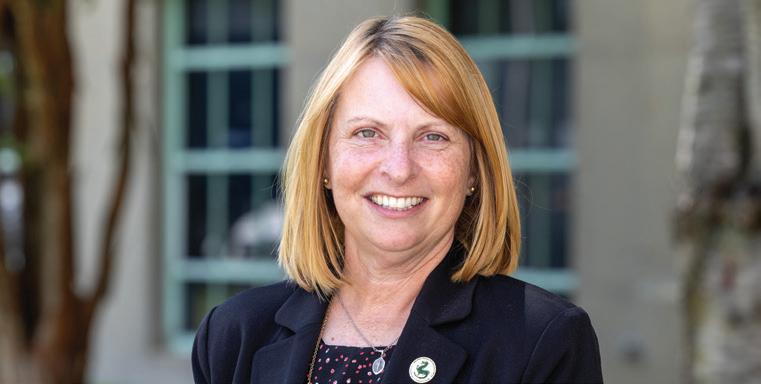





By George Copeland Jr.
A former business manager at All Saints Catholic School
faces up to 20 years in prison for embezzling $239,820 over nearly three years.
Shannel Peoples-Hilliard, who started at the school in May 2021, pleaded guilty last week in federal court to using a school-issued credit card for personal expenses, including luxury goods, vacations and rent, from November 2021 to July 2024.
Court documents say she attempted to disguise the purchases as school-related spending in All Saints’ bank reconciliation reports.
When All Saints officials discovered the inconsistencies in their finances, they “immediately took steps to investigate and report these concerns to law enforcement,” according to Michael Riley, Superintendent of Catholic Schools for the Catholic Diocese of Richmond in a letter to the school’s community last August.
The Catholic Diocese of

Richmond reiterated this position in a statement following the announcement of PeoplesHilliard’s guilty plea.
“We took action as soon as we learned about the allegations and launched our own investigation to identify ways to strengthen the protocols we have in place,” the statement read. “We are grateful to law enforcement for their diligence throughout this process and remain committed to making sure this does not happen again.”
As part of her plea, PeoplesHilliard waived her right to prosecution by indictment and to appeal her conviction and sentencing.
In addition to a potential prison term, she faces fines, asset forfeiture, mandatory restitution to All Saints and up to three years of supervised release. She has agreed to cooperate fully in identifying assets for restitution and forfeiture. Peoples-Hilliard is scheduled to be sentenced on Jan. 22, 2026.

By George Copeland Jr.
Housing concerns and fears of displacement dominated a Saturday meeting between Gilpin Court residents and the Richmond Redevelopment and Housing Authority, where community members pressed officials on redevelopment plans for the neighborhood.
The discussion at Greater Mt. Moriah Baptist Church was calmer than a week earlier, when frustrated residents and supporters walked out after clashing with officials over the same plans.
By Nathaniel Cline
A federal judge in the U.S. Western District Court ruled Tuesday that the Shenandoah County School Board’s decision to restore the name Stonewall Jackson High School violated a group of students’ First Amendment rights by compelling them to promote a positive image of the Confederate general. In siding with the students, U.S. District Judge Michael F. Urbanski wrote that Jackson’s name “is expressive as a symbol of racial exclusion in public schools.” In June 2024, the NAACP Virginia State Conference and five students enrolled in the

after Confederate leaders or references to the Confederacy. Urbanski said the board cannot force anyone to express a message and that the students were being compelled to convey a message endorsing Jackson by attend-
ing a school renamed for him, wearing “Generals” apparel and being identified as “Stonewall Jackson Generals” during extracurricular activities.
“By reinstating the name ‘Stonewall Jackson High School’ and thereby compelling students to advance the School Board’s chosen message favoring ‘Stonewall Jackson’ through the conduct of extracurricular activities rendered expressive by that name, the School Board
The City of Richmond has authorized a $5.8 million payment to a man who spent decades in prison after being wrongfully convicted in 1976 for murder and sexual assault.
City Council voted 8-1 Monday to approve a restitution payment to Marvin Grimm Jr., as required by state law for wrongful convictions that cause significant harm.
Grimm was granted the restitution payment in March by the Virginia General Assembly, after DNA testing exonerated him of the crime last year.
“While nothing can undo the past, this action reflects our commitment to accountability,” Mayor Danny Avula said in a statement after the vote. “It’s about facing challenges and making sure Richmond moves forward with integrity and fairness.”
The vote aimed to resolve months of debate over the city’s plan to pay Grimm, which included a threat from City pays $5.8M to man wrongfully convicted
“I think this discussion was much more civil, much more constructive and people were able to hear other people talk,” RRHA CEO Steven Nesmith said after the meeting. The meeting included tense moments as residents and visitors questioned RRHA’s redevelopment plans, citing the agency’s past handling of Gilpin and other public housing communities.
Criticism of RRHA ranged from housing availability following redevelopment Please turn to A4
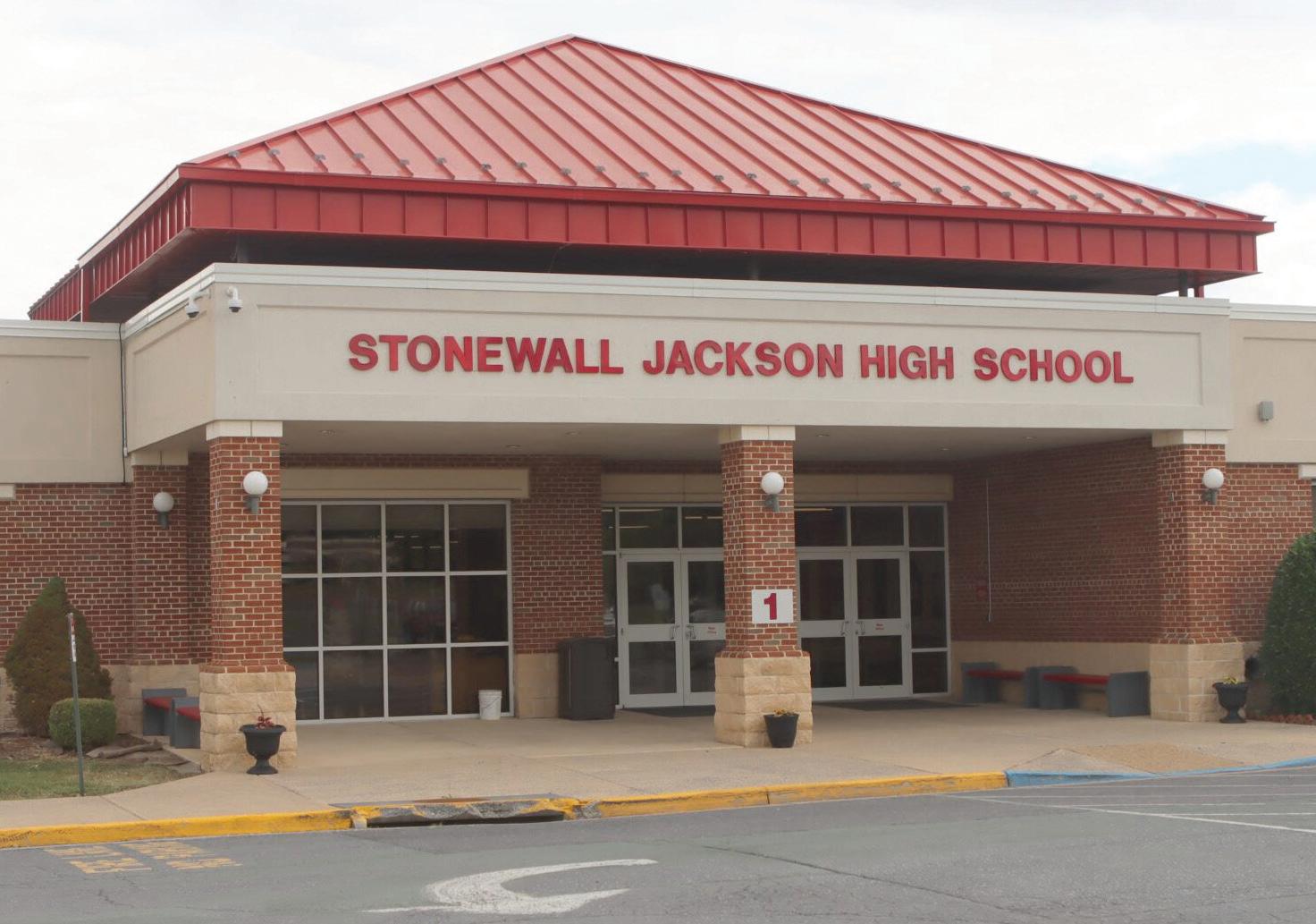
Free Press staff report

Virginia voters will help set the tone for national politics this fall when the state holds one of only two gubernatorial elections in the country. Virginia Commonwealth University’s L. Douglas Wilder School of Government and Public Affairs will explore the stakes during the 2025 Wilder Symposium, “Virginia’s Elections: Our National Importance,” on Thursday, Sept. 25, at 5 p.m. at VCU’s W.E. Singleton Center for the Performing Arts, 922 Park Ave.
Former Gov. L. Douglas Wilder, the nation’s first elected African American governor, will lead a panel of experts discussing how Virginians’ choices could influence the 2026 midterm elections and beyond. The event will include an audience-submitted question-and-answer session.
“Virginia has always stood at the forefront of American history, and off-cycle elections give our citizens a unique opportunity to focus on local issues and lead without being overshadowed by national campaigns,” Wilder said. “This election is about the kind of future we want to build for our children, our communities and our nation. Virginians’ votes carry a national echo.”
Panelists include Wilder School Dean Susan Gooden; political analyst and founding director of the Wilder School Bob Holsworth; associate dean of research and outreach Robyn McDougle; and Niraj Verma, professor of urban and regional planning and public policy and the school’s inaugural dean.
McDougle will share findings from the VCU Wilder School Commonwealth Poll, showing Virginians are divided on Gov. Glenn Youngkin’s leadership, concerned about the rising cost of living, opposed to Medicaid cuts, and critical of efforts to eliminate diversity, equity and inclusion programs.
“This year marks a historic moment as Virginians prepare to elect the Commonwealth’s first female governor,” Gooden said. “The outcome of this election will offer critical insights into public sentiment on pressing national issues such as reproductive rights, immigration and the rising cost of living.”
War Memorial to hold annual Patriot Day ceremony on Sept. 11
Free Press staff report
The Virginia War Memorial will host its annual Patriot Day ceremony on Thursday, Sept. 11, honoring all Americans who were killed or injured in the terrorist attacks on the World Trade Center, the Pentagon and United Flight 93 in Shanksville, Pennsylvania, 24 years ago.

The ceremony, set to begin at 11 a.m., will feature guest speakers, the presentation of memorial wreaths, the tolling of a ship’s bell and patriotic music. Musical selections by the Virginia Barbershop Chorus will begin at 10:45 a.m., and attendees are encouraged to arrive by that time.
Rear Adm. Samuel Cox, retired director of the Naval History and Heritage Command, will deliver the keynote address. Dr. Clay Mountcastle, director of the War Memorial, and representatives from the Freedom Flag Foundation will also speak. Taps will be played by Sgt. Bradley Kirtner of the 29th Infantry Division Band.
The Virginia War Memorial at 621 S. Belvidere St. will be open from 9 a.m. to 4 p.m. A documentary about the Sept. 11 attacks in Virginia will play in Reynolds Theater throughout the day, and a 9/11 exhibit will be on view in the Galanti Education Center. Limited free parking is available in the War Memorial’s surface lots and parking deck. The event is free.

Richmond voters can soon begin casting ballots early for the 2025 elections, including races for governor, lieutenant governor, attorney general and members of the House of Delegates. Early voting allows residents to vote in person before Election Day and can help reduce wait times at polling places.
In Richmond, early voting locations include the Office of Elections at 2134 W. Laburnum Ave., City Hall at 900 E. Broad St. and the Hickory Hill Community Center at 3000 E. Belt Blvd. Henrico County voters can visit the Western Government Center at 4305 E. Parham Road, the Eastern Government Center at 3820 Nine Mile Road, or the Varina Library at 1875 New Market Road. Chesterfield County residents may use the Central Library at 7051 Lucy Corr Blvd.
Early voting begins Friday, Sept. 19, and continues through Friday, Nov. 1, for the general election. Hours are generally Monday through Friday from 8:30 a.m. to 5 p.m., with select Saturdays also open from 9 a.m. to 5 p.m.
The deadline to register to vote in Virginia is Friday, Oct. 24. Residents can register online, by mail, or in person at their local registrar’s office. Voters who prefer to vote by mail can request absentee ballots through the Virginia Department of Elections website or by contacting their local registrar. Requests must be submitted by the posted deadlines to ensure ballots are received and returned in time.
Election officials encourage Virginians to take advantage of early voting to avoid long lines and ensure their participation in the democratic process. For the latest information on locations, hours, registration and deadlines, visit elections.virginia.gov.

By Ben Pavior
Democrat James Walkinshaw decisively won a special election Tuesday to replace former U.S. Rep. Gerry Connolly in Virginia’s 11th Congressional District, narrowing Republicans’ majority in the House of Representatives to six seats.
The Associated Press called the race in Walkinshaw’s favor at 7:36 p.m., with the Democrat taking roughly 75% of the vote compared with Republican contender Stewart Whitson’s 25%.
Connolly endorsed Walkinshaw, his former chief of staff, before he died in May.
Addressing a crowd of supporters Tuesday night, Walkinshaw said his victory marked a political turning point, calling President Donald Trump’s administration “the most corrupt in American history.”
“This is the beginning of the end for Donald Trump’s reckless agenda,” Walkinshaw said.
Walkinshaw, who also serves on the Fairfax County Board of Supervisors, defeated Whitson in a suburban Washington, D.C., district that Democrats have held since Connolly first won the seat in 2008.
Trump figured heavily into Walkinshaw’s campaign. In one ad, Walkinshaw described the election as “our first chance to send a Democrat to Congress since Trump took office again.” He has presented himself as a counterweight to Trump’s agenda on everything from DOGE to the president’s Big Beautiful Bill.
The district’s proximity to the capital loomed large in his race, with Walkinshaw denouncing Trump’s cuts to the federal workforce and his deployment of National Guard troops to D.C.
Whitson, an Army veteran who works for a conservative think tank, faced daunting odds in a district Kamala Harris won by more than 30 points last year. He was also outflanked in fundraising, capturing less than a quarter of the more than $1
million raised by Walkinshaw.
Republican Stewart Whitson unsuccessfully faced off against James Walkinshaw in Virginia’s 11th Congressional District special election on Tuesday, Sept. 9, 2025.
(Photo courtesy of Whitson campaign) Whitson’s rhetoric followed Trumpian themes, calling for an end to “waste, fraud and abuse” and describing the U.S. Department of Education as a “failed experiment.”
On Tuesday night, Whitson conceded, pledging his continued commitment to the state and nation.
“I congratulate my opponent and extend my gratitude to every voter who participated in this important election,” Whitson wrote. Walkinshaw’s election puts a coalition of Democrats and a handful of Republicans one vote closer to forcing a full House vote on the release of records related to disgraced financier Jeffrey Epstein.
Like Walkinshaw, Connolly was a former congressional staffer turned Fairfax supervisor. He won a 2008 race to replace longtime Republican Rep. Tom Davis, fended off a close Republican challenge in 2010 and won the ensuing elections by large margins as Northern Virginia became more solidly Democratic. Connolly announced he had been diagnosed with esophageal cancer in November 2024, days after being reelected.
In April, the top Democrat on the House Oversight Committee said he would not run for reelection and endorsed Walkinshaw shortly thereafter. Connolly died a few weeks later.
Walkinshaw’s campaign briefly drew national attention after Connolly’s social media accounts reiterated those endorsements after the Democrat’s death, in the midst of the ensuing nine-person primary. Walkinshaw emerged with nearly 60% of the vote.
As a supervisor, Walkinshaw voted against adopting Gov. Glenn Youngkin’s model policies for public schools that

aimed to limit transgender students’ access to bathrooms aligned with their gender identity. He backed a plan to replace a county parking lot with 279 units of affordable housing and drove a successful effort to replace the county’s gas-powered leaf blowers with electric ones.
In Congress, Walkinshaw has pledged to work to ban assault-style weapons, expand federal nondiscrimination protections, protect victims of sexual assault and eliminate partisan gerrymandering.
Walkinshaw differs from his former boss on at least one policy item: crypto. Walkinshaw received a $1 million boost in broadcast ads from the crypto lobbying group Protect Progress, Axios reported in June, and touts blockchain as a transformative technology on his campaign website. Connolly consistently voted against industry-backed legislation.
This story originally appeared on VirginiaMercury.com.
Virginia Commonwealth University and Reynolds Community College have launched a dual-admission program designed to give community college students additional support as they transfer to VCU.
The program, called NEXT Step VCU — short for Navigating Educational Excellence Together — was formally introduced Monday with a signing ceremony at Reynolds’ downtown campus. It offers participating students access to advising, academic resources and campus services while they complete their associate degrees.
Students who enroll will receive a waiver of VCU’s application fee, a university ID card and access to VCU’s libraries, facilities and cultural events. The program also promises cost savings through credit guarantees and transfer pathways, aimed at helping students avoid unnecessary classes and graduate on time.
“This exciting new partnership with Reynolds Community College will establish a comprehensive support network for students,” said Seth Sykes, VCU’s associate vice president for transfer initiatives and programs. “Eligible students will become members of the VCU family as they com-

currently offers pathways to 25 degree programs, with more to be added in the future.
“VCU and Reynolds Community College have long worked closely together to support our students and smooth their transition from community college to VCU,” said VCU President Michael Rao. “Our students are motivated and driven to succeed, and this is an excellent way we can help support their success.”
Reynolds President Paula Pando said, “Reynolds graduates have long chosen VCU as their top transfer destination. NEXT Step VCU gives students a direct, efficient path from Red Hawks to Rams, with dual admission, early access to VCU resources and the chance to save time, avoid excess credits and graduate ready for what’s next.”
plete their studies at community college, prepare for a successful transition to VCU and plan for a career after graduation.”
The partnership marks the first phase of the program, which is expected to expand to other community colleges beginning in January. VCU officials said NEXT Step
The program’s first group is expected to include 50 to 100 students. Interested applicants must submit a declaration form through the NEXT Step VCU website by Oct. 1.
Eligible students must have a high school diploma or GED, be enrolled at Reynolds, hold a minimum 2.0 GPA after 12 credits, and have no more than 30 credits completed at the time

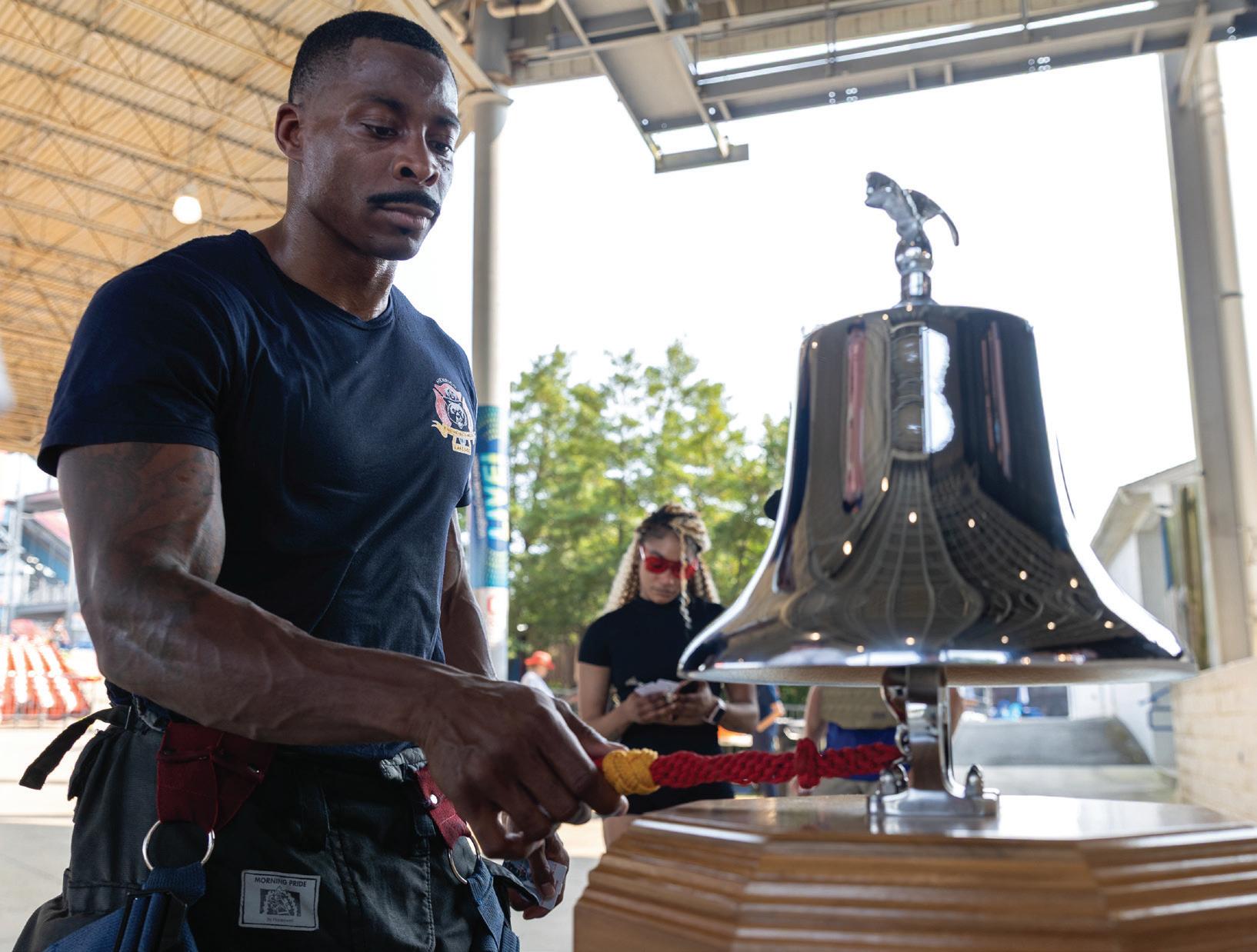
4 DE NOVIEMBRE DE
De: GOBERNADOR, VICEGOBERNADOR, FISCAL GENERAL, REPRESENTANTES A LA CÁMARA DE DELEGADOS DE VIRGINIA Y CARGOS LOCALES
SE REQUIERE PRESENTAR IDENTIFICACIÓN PARA VOTAR EN PERSONA Por favor verifique su registro electoral, lugar de votación y las formas de identificación que se aceptan ANTES de ir a votar. Puede verificar la información en la página www.elections.virginia.gov
LOS PUESTOS DE VOTACIÓN ATENDERÁN EL DÍA DE ELECCIONES
DESDE LAS 6 A.M. HASTA LAS 7 P.M.
Todos los habitantes elegibles de Virginia que hayan cumplido los 18 años antes del 4 de noviembre de 2025 pueden registrarse y votar en estas elecciones.
INFORMACIÓN
Oficina Electoral
2134 West Laburnum Avenue, Richmond, Virginia 23227
La votación temprana se inicia el 19 de septiembre y se cierra el 1o de noviembre.
8:30 a.m. - 5 p.m. (De lunes a viernes)
9 a.m. - 5 p.m. (Los sábados 25 de octubre y 1o de noviembre)
Centro Comunitario Hickory Hill
3000 East Belt Boulevard Richmond, Virginia 23234
La votación temprana se inicia el 20 de octubre y se cierra el 1o de noviembre.
8:30 a.m. - 5 p.m. (De lunes a viernes)
9 a.m. - 5 p.m. (Los sábados 25 de octubre y 1o de noviembre) Ayuntamiento Municipal
900 East Broad Street, Richmond, Virginia 23219
La votación temprana se inicia el 20 de octubre y se cierra el 1o de noviembre.
8:30 a.m. - 5 p.m. (De lunes a viernes)
9 a.m. - 5 p.m. (Los sábados 25 de octubre y 1o de noviembre)
Puede obtener su precinto electoral, lugar de votación, distrito electoral local, estatal y del congreso con mapas imprimibles, llamando a la oficina del registrador al (804) 646-5950 o en la página www.rva.gov/elections/precincts
LA FECHA LÍMITE PARA REGISTRARSE PARA VOTAR EN ESTAS
ELECCIONES ES EL viernes 24 de octubre de 2025
Las personas que poseen una identificación emitida por el Departamento de Vehículos a Motor (DMV) pueden registrarse para votar, actualizar su registro de votante o solicitar su voto en ausencia en la página de Internet www.elections.virginia.gov/citizen-portal
Los votantes puede registrarse después de la fecha límite en una de nuestras sedes de votación anticipada o en un precinto electoral el mismo día de las elecciones. Dichos votantes podrán utilizar una papeleta electoral provisional.
buzones están ubicados en:
Richmond, Virginia 23227 ovisite la página www.rva.gov/elections


to a lack of neighborhood investment and the continued use of police for security during discussions.
“I started coming to these meetings three, four years ago and you’re still not bringing answers to the residents,” said Brothers Concerned for Gilpin member Edward Mayo. “You avoid the questions like they’re causing the problem by asking.”
Richmond City Council member Stephanie Lynch, who represents the 5th District, was among the sharpest critics, repeating her skepticism of RRHA’s plans for Gilpin and its priorities.
She pointed to her work with Creighton Court residents displaced during that neighborhood’s redevelopment, despite measures like housing choice vouchers and a tenant bill of rights, when questioning what could happen to families in Gilpin.
“As a social worker, guess how many families that I have managed that were former Creighton residents and they’re living off of Nine Mile Road in hotels with their families?” Lynch said. “Over my dead … body will our people in this city have to go through the pain and the trauma of being displaced like that and not have anywhere to go.”
Nesmith and other RRHA and housing officials stressed the importance of building tenant self-sufficiency and not reconcentrating poverty when discussing their plans. They also pointed to a lack of money when responding to questions about longstanding maintenance issues and redevelopment funding methods.
RRHA has said there isn’t enough federal, state and local funding available to redevelop all of Gilpin, leading them to rely on alternate methods. A stakeholders meeting with Gilpin and Jackson Ward residents may be held in October, according to Nesmith, with further community discussions expected in the months ahead.
Dominion proposes new rates for residents, data centers
By Tyler Blake VCU Capital News Service
Dominion Energy and the Virginia State Corporation Commission last week began a multiday hearing to evaluate a proposed energy rate increase for homeowners.
The proposed energy cost increase is part of a biennial review that could see homeowners paying a combined $21 more per month on their energy bill.
These costs will be split, with an initial rate increase of $8.51 per month starting Jan. 1, 2026, and another $2 per month the following year. Dominion has also proposed a nearly $11 increase in fuel rates for homeowners.
As it currently stands, Dominion’s household power bills remain below the national average, according to the U.S. Energy Information Administration.
The VSCC began its hearing on Sept. 2 to evaluate this proposal.
“Primarily, the fundamental reason why we’ve proposed new electricity prices is because electricity costs significantly more today than it did two years ago,” said Dominion Energy spokesperson Aaron Ruby.
Additionally, power demand has grown at historic levels.
“We set 10 all-time records this year for single day power demand in Virginia,” Ruby said.
Virginia uses more energy than it can generate, and leans on the regional energy grid for additional support, according to the U.S. Energy Information Administration.
As a result, Dominion is putting funds toward creating new energy sources.
Dominion’s Coastal Virginia Offshore Wind farm, a $10.7 billion project, aims to bring power to more Virginians as demand increases. It will generate enough power for 660,000 homes and businesses when it’s finished next year, according to Ruby.
“It’s a big part of our … strategy to reliably serve growing demand,” Ruby said. “We’re building the largest offshore wind project in the country off the coast of Virginia Beach.”
A similar, nearly finished project off the coast of Rhode Island was recently shut down by the Trump administration. Other projects had funding pulled by the Department of Transportation, according to WHRO.
When asked if Dominion’s project could also be affected, Ruby declined to comment, stating that he would not address hypotheticals.
Data centers are at the forefront of this demand increase, not homeowners or offices. Residential use accounts for one-third of all energy consumption. The commercial sector, which includes data centers, accounts for 56% of all energy use in the state.
This type of usage has skyrocketed in the state in recent years, while residential use is at a 20-year lowpoint, based off of a recent data visualization from the Virginia Public Access Project.
Concerned citizens submitted hundreds of comments opposing the rate increase.
“As a residential ratepayer, I urge the SCC to protect consumers like myself from unfairly subsidizing the exploding energy demands of data centers,” stated one comment, though many others echoed the sentiment.
Dominion also proposed a new rate class for high energy users, such as data centers, with the goal of protecting the average customer from “stranded costs.”
A majority of the data centers are concentrated in Northern Virginia, which is also projected to have 37% of the state’s population in the coming years, according to the Weldon Cooper Center for Public Service at the University of Virginia.
Environmental advocates are concerned by the resources data centers require and project even higher consumer costs.
“A single facility can use the same energy as up to 80,000 households,” said Lee Francis, chief program and communications officer with the Virginia League of Conservation Voters. “A recent study showed that if we don’t take action, data centers could drive up Dominion electric bills by more than $400 a year by 2040.”
Lower-income and fixed-income residents already struggle with energy costs.
Nonprofit organization project:HOMES helps individuals and families secure and maintain affordable housing. They provide varying services like weatherization to help lower energy bills for households that meet the income threshold, according to Bryan Burris, vice president of energy conservation programs with the organization.
An energy auditor is sent to assess the homes of approved applicants and then the organization determines “the most costefficient, cost-effective upgrades that would help the client,” Burris said. That could mean anywhere from a 15% to 30% reduction.
The VSCC hearing could stretch through the week, with a decision not expected until December, according to the Virginia Mercury.

ensure RRHA engaged the community more. “As long as he continues to listen, and continues to have these meetings, then I don’t see no problem.”
has violated plaintiffs’ First Amendment rights, as incorporated by the Fourteenth Amendment, against compelled speech,” Urbanski wrote.
He granted the students’ summary judgment, denied the School Board’s counter motion and deferred a final judgment on the matter. A trial is set for Dec. 8.
“The federal district court judge delivered a powerful victory for students, affirming that they cannot be obligated to promote the legacy of Stonewall Jackson — a symbol deeply associated with the Confederacy,” Marja Plater, senior counsel at one of the law firms representing the civil rights group and students, said in a statement Wednesday. “The court’s opinion makes it unmistakably clear: students deserve the freedom to define themselves unencumbered by symbols they do not choose.”
Li Reed, an attorney with Covington
& Burling, which is also representing the plaintiffs, called the decision a “key vindication” of what their clients have argued since the reinstatement of the Confederate name was proposed by the School Board. Students said being forced to constantly espouse pro-slavery, anti-Black messages is a violation of their First Amendment rights.
The Rev. Cozy Bailey, president of the NAACP Virginia State Conference, said the ruling “reinforces what we know to be true; those who led the Confederacy should not be honored.”
On May 10, 2024, the Shenandoah County School Board reversed a 2020 decision by a previous board to rename two schools bearing the names of Confederate leaders Turner Ashby, Robert E. Lee and Thomas “Stonewall” Jackson as part of a nationwide effort to make schools more inclusive and equitable.
Supporters of the school names’ reversal say the Confederacy represents a heritage
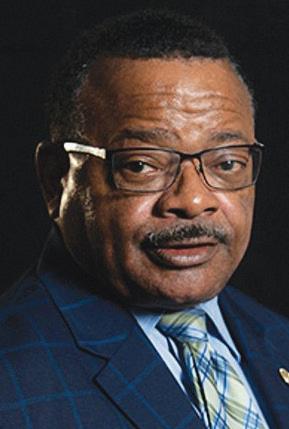
of Southerners’ courage against the federal Union and a fight for states’ rights. Civil rights groups and Shenandoah students and families who oppose the renaming view the Confederacy as defenders of slavery and a foundational part of America’s history of racism, and say modern use of Confederate symbols contributes to racial tensions.
Between the 1950s and 1960s, Shenandoah County officials named public schools after Confederate leaders. School Board officials did not immediately respond to a request for comment.
This story originally appeared on VirgniaMercury.com.

Gov. Glenn Youngkin to withhold state funding if Richmond did not comply. Still, additional concerns were raised during the meeting before the vote.
Residents and housing advocates spoke in opposition to the transfer of money from the Delinquent Sales Tax Special Fund for the payment, as some of the special fund is meant to be allocated to the Affordable Housing Trust Fund (AHTF).
Advocates have criticized the city for not following a 2019 City Council policy for annual allocations to the AHTF. While those opposed believe Grimm is owed compensation, they argued this method would impact efforts to address housing issues residents face.
“We do not believe the city should throw the baby out with the bathwater by addressing one injustice while simultaneously undermining the city’s commitment to solving another,” said Richmond and Virginia NAACP Housing Chair Tracey
Hardney-Scott.
Council members Kenya Gibson, 3rd District, and Ellen Robertson, 6th District, voiced their own concerns over future restitution payments and affordable housing during the council discussion that followed. Gibson ultimately chose to vote against the ordinance to show her support for following city law.
“I do believe that at some point we’ve got to make a decision to correct this travesty that the Grimm family is facing, and I want to get that done and behind me,” Robertson said. “And then I want to be assured that we have put things in place that we won’t be facing the same option of rediverting funds that we’ve committed to this source.”
The city is attempting to address concerns over its housing focus, as Avula announced plans during the meeting to add $2 million to the AHTF through a budget amendment transferring money from the special fund. The transfer would raise Richmond’s AHTF allocation for the
2026 fiscal year to $15 million.
City Council also delayed action on the proposed $6,500 sale of city-owned property at 8790 Strath Road in Henrico County to Del. Delores McQuinn and her husband, who live next door and inquired about buying the lot last year.
Residents speaking during public comments, as well as 1st and 4th District Council members Andrew Breton and Sarah Abubaker, questioned whether the city could get a better deal and pushed for the council to consider other offers. Henrico has assessed the property’s worth at $5,400. Council members voted 5-2-1 to continue the ordinance, with Robertson and Council President Cynthia Newbille voting against and 5th District Council member Stephanie Lynch abstaining.
The council also approved the policies and procedures of the Civilian Review Board after months of discussion, more than four years after the board was created to review police shootings and other allegations of misconduct.
By Christine Fernando and Claudia Lauer Associated Press
As President Donald Trump threatens to expand immigration raids and deploy the National Guard, Chicago has become the latest flashpoint in a broader national struggle over how far the federal government can push local authorities to cooperate with its immigration agenda.
For the Chicago Police Department, the challenge is acute. The force must preserve public safety in a city already under strain while avoiding the appearance of working hand-in-hand with federal immigration authorities, a stance that could erode community trust and ignite new protests.
The same balancing act has confronted other big-city departments in recent months. Local police in Los Angeles and Washington were drawn into fraught arrangements with federal agencies that experts say left residents wary and, at times, undermined public confidence in their police.
Now, Chicago finds itself on the same path, with Illinois Gov. J.B. Pritzker objecting to any National Guard deployment and city officials bracing for how the added federal presence could reshape the dynamic on the ground. The outcome, policing experts warn, may determine whether Chicago police can maintain credibility in immigrant communities likely to be targeted by a president determined to show force.
“What the Trump administration is doing here is engaging in federal policing in a way that really rips at the seams of the relationships between state and local police and the federal government, between communities and law enforcement,” said Nayna
Gupta, policy director at the American Immigration Council. “Those kinds of standoffs and contentious practices is what erodes public safety.”
Sanctuary city conflicts
Over the course of the Trump administration’s immigration surges, Chicago officials repeatedly reaffirmed the city’s so-called sanctuary policies that have been in place for four decades. But as fear grew about looming U.S. Immigration and Customs Enforcement actions, the city’s mayor has avoided detail about how local police will navigate tensions on the ground.
Chicago’s policies bar local law enforcement from asking about or detaining someone for their immigration status or from supporting ICE, including by securing perimeters for raids, transporting detainees, or sharing information about undocumented immigrants.
Mayor Brandon Johnson signed an executive order last week declaring city police would not collaborate with federal immigration agents.
It also requires Chicago officers to wear uniforms and not wear masks to “clearly distinguish them from federal agents.”
“We will not have our police officers who are working hard every single day to drive down crime deputized to do traffic stops and checkpoints for the president,” Johnson said before signing the order.
Craig Futterman, a law professor at the University of Chicago, said any cooperation between ICE and local officers hurts public trust and blurs the lines between agencies.
“It can get really messy,” Futterman said. “There’s how sanctuary cities are supposed to work on paper versus what happens in practice.”
Caught between protesters and ICE officials
Gupta said Chicago police will have to coordinate with federal agencies to some degree, even to respond to protests against immigration raids and detentions.
In the meantime, city officials say they’re following a similar strategy to policing as the one in place around the 2024 Democratic National Convention, which cost the city about $27 million in officer overtime.
ICE detained at least 10 Chicagoans at an immigration office on June 4, drawing dozens of protesters and local elected officials to the street outside. Police didn’t originally know it was an immigration action and left after realizing that, officials said.
Some protesters and local elected officials claimed they saw Chicago officers clearing the way for ICE agents and protecting their vehicles. Chicago City Council members demanded an internal probe into officers’ behavior.
Similar tensions played out in California, where hundreds of protesters clashed with federal immigration authorities in June, prompting Trump to deploy thousands of National Guard troops to Los Angeles, despite objections from local authorities.
Los Angeles police made hundreds of arrests and dispersed demonstrations, including at locations where ICE agents were conducting raids.
Sanctuary city policies “don’t mean a local police officer will stand in between an ICE officer and a noncitizen,” which would be considered an obstruction of justice, said Rose Cuison-Villazor, a professor at Rutgers University Law School.
But whether local officers step in if they disagree with federal agents’ interactions with protesters is also
uncertain.
“Do they have the power to intervene?” Futterman asked. “These are really difficult legal questions. It’s a really fraught situation.”
Local police, National Guard interactions not clearly defined
Chuck Wexler, executive director of the Washington-based think tank the Police Executive Research Forum, said local police leaders are used to working with federal authorities, including joint task forces aimed at terrorism, drugs or organized crime. But if the National Guard is deployed in Chicago, its role in performing local policing hasn’t been clearly defined.
On Thursday, the District of Columbia sued to stop Trump’s deployment of the National Guard during his law enforcement intervention there.
“As far as the National Guard as police, they have traditionally assisted in natural disasters, large-scale disturbances, and aiding law enforcement in support functions like traffic and crowd control,” Wexler said. “I don’t recall the National Guard being deployed to deal directly with day-today crime issues.”
Chicago Police Superintendent Larry Snelling has asked for more communication from federal authorities so “we don’t have people running scared and it doesn’t create chaos on our streets.”
In Philadelphia, District Attorney Larry Krasner says the Trump administration’s use of the National Guard is a threat to successful prosecutions of crime, risking witness statements being thrown out and evidence suppressed.

Kenneth Corey, a former department chief with the New York City Police Department, warned that surging resources like the National Guard leads to an artificial and often temporary reduction in crime.
“Any time you surge resources like that you are going to see an immediate reduction in crime because it has a deterrent effect,” said Corey, who now works at the University of Chicago Crime Lab’s Policing Leadership Academy.
“But the problem is it’s short-lived. It can’t be sustained. When they leave, crime returns. You haven’t addressed the root causes of crime.”
“None of these people are trained in evidence-gathering procedures,” Krasner said. “None of them are trained in Miranda warnings. None of them are trained in Fourth Amendment rights and procedures and illegal searches and seizures.”
By Hannah Schoenbaum, Alanna Durkin Richer, Mark Sherman and Eric Tucker Associated Press
Charlie Kirk, a conservative activist and close ally of President Donald Trump who played an influential role in rallying young Republican voters, was shot and killed Wednesday at a Utah college event in what the governor called a political assassination carried out from a rooftop.
“This is a dark day for our state. It’s a tragic day for our nation,” said Utah Gov. Spencer Cox. “I want to be very clear this is a political assassination.”
No one was in custody late Wednesday, though authorities were searching for a new person of interest, according to a law enforcement official familiar with the matter who was not authorized to discuss the situation by name and spoke on condition of anonymity.
Authorities had earlier provided evolving information on the status of the manhunt, with FBI Director Kash Patel initially saying on social media that a “subject” had been taken into custody, only to later say that the person had been released after being questioned.
Authorities did not immediately identify the person who had been in custody, a motive or any criminal charge.
But the circumstances of the shooting drew renewed attention to an escalating threat of political violence
in the U.S. that in the last several years has cut across the ideological spectrum. The assassination drew bipartisan condemnation, but a national reckoning over ways to prevent political grievances from manifesting as deadly violence seemed elusive.
People were seen exiting a building at Utah Valley University after Kirk, the CEO and co-founder of the conservative youth organization Turning Point USA, was shot at the campus event.
Videos posted to social media from Utah Valley University show Kirk speaking into a handheld microphone while sitting under a white tent emblazoned with the slogans “The American Comeback” and “Prove Me Wrong.” A single shot rings out, and Kirk can be seen reaching up with his right hand as a large volume of blood gushes from the left side of his neck.
Stunned spectators are heard gasping and screaming before people start to run away. The Associated Press was able to confirm the videos were taken at Sorensen Center courtyard on the Utah Valley University campus.
Kirk was speaking at a debate hosted by his nonprofit political organization. Immediately before the shooting, he was taking questions from an audience member about mass shootings and gun violence.
“Do you know how many transgender Americans have been mass shooters over the last 10 years?” the person asked. Kirk responded, “Too many.”
The questioner followed up: “Do
(Ref: Virginia Code § 58.1-3321)
The City of Richmond proposes to increase property tax levies.
you know how many mass shooters there have been in America over the last 10 years?”
“Counting or not counting gang violence?” Kirk asked.
Then a single shot rang out. The shooter, who Cox pledged would be held accountable in a state with the death penalty, wore dark clothing and fired from a roof on campus some distance away.
The death was announced on social media by Trump, who praised the 31-year-old Kirk as “Great, and even Legendary.”
“No one understood or had the Heart of the Youth in the United States of America better than Charlie,” Trump posted on his Truth Social account.
Utah Valley University said the campus was immediately evacuated and remained closed. Classes were canceled until further notice. Those still on campus were asked to stay in place until police officers could safely escort them off campus. Armed officers walked around the neighborhood bordering the campus, knocking on doors and asking for information on the shooter.
Officers were seen looking at a photo on their phones and showing it to people to see if they recognized a person of interest.
The event, billed as the first stop on Kirk’s “The American Comeback Tour,” had generated a polarizing campus reaction. An online petition calling for university administrators to bar Kirk from appearing received
1. Assessment Increase: Total assessed value of real property, excluding additional assessments due to new construction or improvements to property, exceeds last year’s total assessed value of real property by 5.74 percent.
2. Lowered Rate Necessary to Offset Increased Assessment: The tax rate which would levy the same amount of real estate tax as last year, when multiplied by the new total assessed value of real estate with the exclusions mentioned above, would be $1.146 per $100 of assessed value. This rate will be known as the “lowered tax rate.”
3. Effective Rate Increase: The City of Richmond proposes to adopt a tax rate of $1.16 per $100 of assessed value. The difference between the lowered tax rate and the proposed rate would be $0.014 per $100, or 1.3 percent. This difference will be known as the “effective tax rate increase.”
Individual property taxes may, however, increase at a percentage greater than or less than the above percentage.
4. Proposed Total Budget Increase: Based on the proposed real property tax rate and changes in other revenues, the total budget of the City of Richmond will exceed last year’s by 3.7 percent.
A public hearing on the increase will be held on September 22, 2025, at 6:00 p.m. in the Council Chamber, located at 900 East Broad Street, Richmond, Virginia 23219.
nearly 1,000 signatures. The university issued a statement last week citing First Amendment rights and affirming its “commitment to free speech, intellectual inquiry, and constructive dialogue.”
Last week, Kirk posted on X images of news clips showing his visit was sparking controversy. He wrote, “What’s going on in Utah?”
The shooting drew swift condemnation across the political aisle as Democratic officials joined Trump, who ordered flags lowered to half-staff and issued a presidential proclamation, and Republican allies of Kirk in decrying the violence.
“The attack on Charlie Kirk is disgusting, vile, and reprehensible,” Democratic California Gov. Gavin Newsom, who last March hosted Kirk on his podcast, posted on X.
“The murder of Charlie Kirk breaks my heart. My deepest sympathies are with his wife, two young children, and friends,” said Gabrielle Giffords, the former Democratic congresswoman who was wounded in a 2011 shooting in her Arizona district.
The shooting appeared poised to become part of a spike of political violence that has touched a range of ideologies and representatives of both major parties. The attacks include the assassination of a Minnesota state lawmaker and her husband at their house in June, the firebombing of a Colorado parade to demand Hamas release hostages, and a fire set at the house of Pennsylvania’s governor, who is Jewish, in April.
The most notorious of these events is the shooting of Trump during a campaign rally last year.
Former Utah Congressman Jason Chaffetz, a Republican who was at Wednesday’s event, said in an interview on Fox News Channel that he heard one shot and saw Kirk go back.
“It seemed like it was a close shot,” said Chaffetz, who seemed shaken as he spoke.
He said there was a light police presence at the event and that Kirk had some security but not enough.
“Utah is one of the safest places on the planet,” he said. “And so we just don’t have these types of things.”
Turning Point was founded in suburban Chicago in 2012 by Kirk, then 18, and William Montgomery, a tea party activist, to proselytize on college campuses for low taxes and limited government. It was not an immediate success.
But Kirk’s zeal for confronting liberals in academia eventually won over an influential set of conservative financiers.
Despite early misgivings, Turning Point enthusiastically backed Trump after he clinched the GOP nomination in 2016. Kirk served as a personal aide to Donald Trump Jr., the president’s eldest son, during the general election campaign.
Soon, Kirk was a regular presence on cable TV, where he leaned into the culture wars and heaped praise on the then-president. Trump and his son were equally effusive and often spoke at Turning Point conferences.
(Ref: Virginia Code § 58.1-3321)
The City of Richmond proposes to increase property tax levies.
1. Assessment Increase: Total assessed value of real property, excluding additional assessments due to new construction or improvements to property, exceeds last year’s total assessed value of real property by 5.74 percent.
2. Lowered Rate Necessary to Offset Increased Assessment: The tax rate which would levy the same amount of real estate tax as last year, when multiplied by the new total assessed value of real estate with the exclusions mentioned above, would be $1.146 per $100 of assessed value. This rate will be known as the “lowered tax rate.”
3. Effective Rate Increase: The City of Richmond proposes to adopt a tax rate of $1.20 per $100 of assessed value. The difference between the lowered tax rate and the proposed rate would be $0.054 per $100, or 5.0 percent. This difference will be known as the “effective tax rate increase.”
Individual property taxes may, however, increase at a percentage greater than or less than the above percentage.
4. Proposed Total Budget Increase: Based on the proposed real property tax rate and changes in other revenues, the total budget of the City of Richmond will exceed last year’s by 5.5 percent.
A public hearing on the increase will be held on September 22, 2025, at 6:00 p.m. in the Council Chamber, located at 900 East Broad Street, Richmond, Virginia 23219.
In the years after a devastating terror attack killed 2,977 Americans on Sept. 11, 2001, in New York, Virginia and Pennsylvania, annual remembrances and memorials sprang up that kept the tragedy and trauma front of mind for at least a day or so.
For anyone who was around to witness the attacks or the coverage of them, it was hard to imagine at the time that more than 20 years later, we would still need reminders of the deadliest attack on American soil. But here we are.
Much has happened since then, as tragedies and devastating events have piled on and we’ve become accustomed to life after 9/11. Perhaps the most recent reminder of those days was a July 8 change by the TSA, which no longer requires the minor inconvenience of passenger shoe removal at airport checkpoints. That rule was introduced after another planned terrorist attack, this one by a man who would become known as the “Shoe Bomber,” who attempted to ignite explosives hidden in his shoes on American Airlines Flight 63. He was overpowered by passengers and flight crew, taped to his seat and arrested later. The small policy change reminds us how profoundly that day altered American life.
Locally, there are organizations that have taken on the tasks of remembering those who lost their lives on this tragic day. Earlier this week, the 9/11 Heroes Run at the Eanes-Pittman Public Safety Training Center in Chesterfield drew participants who ran, walked or rucked a 5K to honor the heroes of 9/11 and those who have served bravely since. (If you’ve never “rucked” ask a friend in the military about this exercise.)
Also on Sept. 6, the Metro Richmond 9/11 Memorial Stair Climb & Walk returned to Richmond Raceway, offering a chance to climb the equivalent of the 110 stories of the World Trade Center towers or walk the same distance around the track.
“This day is about remembrance, resilience and community,” said Steve Korb, public information officer for the Metro Richmond Flying Squad, which organized the event. “Every step taken is a tribute to those who made the ultimate sacrifice.”
If you missed those events, there are still ways to come together and remember. On Thursday, Sept. 11, the Commonwealth’s Patriot Day Ceremony at the Virginia War Memorial offers a moment to pause and reflect. The ceremony will run from 11 a.m. to noon and honor the courage and sacrifice of first responders and service members.
Also Thursday, the University of Richmond will hold its annual September 11 Memorial Walk from 8:30 a.m. to 2 p.m. The community is invited to walk around the memorial benches honoring four UR alumni who died on 9/11. Remarks and a prayer will be offered at 8:30 a.m., with moments of silence at 8:46, 9:03, 9:37 and 10:03 a.m. — times that correspond to the crashes of the four hijacked planes — providing time for quiet reflection on the lives lost that day.
As time passes, these moments remind us that remembrance is not only about looking back but also about bringing the courage, resilience and unity of that day forward. We certainly could use that kind of sentiment today, as our country faces deep divisions, instability and moments that challenge our sense of community. In a world where there are forces determined to divide us, remembering teaches us to stand together.

I was reminded of the 1920s.
I started out this year, 2025, in Chicago, honored to give the Martin Luther King Jr. Day address at the Rev. Jesse Jackson’s big gathering.
The timing was unforgettable. As I stepped to the podium on the South Side, Donald Trump was taking the oath of office in Washington. His inaugural speech was a drumbeat for a new era of hostility toward immigrants and people of color. Mine, at that very moment, was a call for Chicago’s Black middle class to choose solidarity with recent immigrants in resisting such hatred and violence.

That juxtaposition has stayed with me, and it came back into focus when I returned to Chicago more recently. This city has always been a stage for America’s great struggles. From the marches for labor rights at Haymarket in the 1880s, to the rallies for civil rights in the 1960s, to the immigration raids and protests of this year, Chicago has a way of putting our unfinished business right in front of our eyes.
Walking its streets in 2025,
Then, too, Chicago was alive with both promise and peril. Jazz poured from clubs in Bronzeville, poetry from the pens of the Harlem Renaissance, and industrial might from the stockyards. But alongside all that creativity came the sting of exclusion: Prohibition raids, gangland violence and the rise of a Ku Klux Klan that, for a time, had as many members in Indiana as in Mississippi.
A century later, the echoes are unmistakable. Today, Chica-
go is once again in the headlines as federal agents sweep through immigrant neighborhoods; as protests spill onto Lake Shore Drive; as tensions around race, belonging and identity bubble to the surface. And just as in the 1920s, the people in the streets are not simply angry mobs as the headlines often portray them. They are families fighting to be seen, communities demanding dignity, and young people refusing to inherit a broken status quo.
This is part of a longer American rhythm. Our centuries often rhyme decade by decade. The 1820s, for example, saw Andrew Jackson’s populist
movement rise to power. It promised more democracy for white men, but it also unleashed brutal racism. Jackson’s appeal rested on dispossessing Native Americans through forced removal and fanning hostility toward Mexicans and free Black people. That brand of populism was intoxicating for some but devastating for others. One hundred years later, the 1920s played a similar tune: new cultural freedoms for some, paired with an immigration crackdown and a Klan resurgence. And here we are, in the 2020s, facing our own battles over who truly belongs.
It is tempting to despair — to think the cycle means we are trapped. But history shows something else. The “’20s” are turbulent, but they force the country to face its contradictions. The “’30s” bring reckonings, the “’40s” wars of ideas and arms, the “’50s” fresh anxieties, the “’60s” bursts of reform. And the “’70s”? Oddly enough, the “’70s” tend to be the decades when the nation exhales and reimagines itself.
The 1770s gave us the American Revolution and the Declaration of Independence, proclaiming that all men are created equal and endowed with inalienable rights: life, liberty, and the pursuit of hap-
didn’t have.
I thought I knew a lot about displacement, housing insecurity and homelessness. Then I experienced it for real.
piness. The 1970s saw the end of the Vietnam War, the fall of Jim Crow, and the rise of new movements for women’s rights, environmental protection and inclusion. If the pattern holds, the 2070s could be the moment when our grandchildren inherit a democracy closer to the promise in our founding documents.
Each American century moves to a similar rhythm. The “’20s” are always turbulent — testing our patience and our faith. But they also call forth courage, creativity and the determination to build something better.
As I tell my son, all the rising generations must do is make sure American democracy survives to the 2070s. After all, in America, the “’70s” tend to be much better than the “’20s.” The writer is a professor of practice at the University of Pennsylvania and a former national president and CEO of the NAACP.
I grew up with a roof over my head and earned a Ph.D., writing a dissertation about families displaced from their homes. But instead of the American dream, I found a rude awakening.
Stories like mine are all too common in the midst of our country’s ongoing housing crisis.

Jobs in my field are scarce, and I was told I was overqualified for the jobs I could find. Always a fighter, I started my own consulting company helping nonprofits develop strategies that drive lasting change in families’ lives.
Even so, startups are hard to finance and grow. I struggled, but I was getting by — until I was evicted.
I had been renting a town home from a private landlord for more than six years when I received an email stating I had 30 days to vacate. The landlord had raised my rent and promised a new lease agreement, but never produced one — and then evicted me because I didn’t have a lease.
Through my work, I had been steeped in stories of family displacement. But it felt different to experience it firsthand — with no recourse and no way to hold my landlord accountable. Tenants can theoretically take landlords to court, but that takes money I
There simply isn’t enough affordable housing to meet
the immense need. According to the National Association of Home Builders, the median price for a single-family house reached a record high of more than $412,000 last year. The National Low Income Housing Coalition calculates there’s a national shortage of 7 million affordable rental units.
Wages aren’t keeping up with housing costs. There’s currently no city in the country where you can afford a market-rate two-bedroom rental on the minimum wage. And a record 75% of renters are severely cost burdened, meaning over half their income goes to housing.
Living unhoused is nonstop stress. I had to move from hotel to hotel, chasing Priceline deals and spiking my stress levels. Unsurprisingly, there are many adverse health outcomes associated with housing insecurity, including delayed access to health care, worsening health outcomes and erosion of communities.
I managed to get a remote contract job, but I lost it when I couldn’t begin the same month I was evicted. Thankfully, a sorority sister eventually offered me a room in her home.
Currently, I’m OK. I have housing, Medicaid and a client, too — for now. But I’m more acutely aware than ever that we need more tenant rights and landlord accountability. And I still need to pay renters insurance, car insurance, business fees and storage fees and jump through increasing red tape to keep my benefits.
Homelessness and housing instability are expensive — for individuals and for governments. And the problem could get worse. President Trump has called for cuts to public housing programs, including nearly $30 billion in federal rental aid and Section 8 housing vouchers.
What should we do instead?
A proposed federal law would offer funding for legal counsel for low-income renters facing eviction. Many states now have laws that prohibit evictions without just cause, prohibit excessive rent increases, prevent landlords from discriminating against renters with Section 8 vouchers and fund rental assistance.
Research shows that policies like these significantly increase housing stability.
I grew up in an income-stable home, earned a Ph.D. and own a small business. If someone like me can get trapped in the cycle of housing instability, anyone can. But the solutions are out there — we just need lawmakers to hear us.
The writer is the founder and principal consultant at Integrity Consultancy Group in Northern Virginia. This op-ed was distributed by OtherWords.org.




Sixty years ago, on Oct. 3, 1965, President Lyndon B. Johnson signed the HartCeller Immigration Reform Act into law. LBJ’s signature ended 40 years of race-based National Origins policy that favored bringing white northern European immigrants to the U.S. and restricted immigrants from less-desirable parts of Europe, along with additional roadblocks for people from Asia, Latin America and Africa.

Six decades ago, change meant immigrants eager or desperate to come to the U.S. legally could apply without restrictions based on their country of origin.
The legislative architect of this revolution in American demographics and culture was Emanuel Celler, a congressman who served Brooklyn, New York, two months shy of 50 years, from 1923 to 1973.
I wrote a 2020 biography of Celler (1888–1981) because I was intrigued by his immigration crusade. He represented a district populated with Americans of Jewish, Italian and Irish descent plus African Americans who could trace their roots to the 1630s, when the land was Dutch-colonized New Amsterdam.
By the 1920s, there was a nativist U.S. backlash to restrict immigrants pouring in from eastern and southern Europe, deemed the “wrong white people” to be accepted in the U.S. Celler and a handful of young congressmen representing immigrant-heavy urban districts waged a gallant but futile fight against the nativist assault. President Calvin Coolidge in 1924 signed National Origins into law.
Celler, however, was tenacious. He sounded alarms in the late 1930s that Nazis were slaughtering Jews and argued America should open its doors
On Tuesday, Sept. 2, Vicky Hester, longtime owner of “Babes of Carytown,” one of the nation’s oldest and last remaining lesbian bars, passed away from cancer at the age of 71. For nearly 40 years, Babes endured while many other queer spaces disappeared. Though known as an LGBTQIA+ landmark, Babes was much more. I often dined on Vicky’s daily lunch specials, and in the late 1990s, her restaurant became a welcome refuge from a toxic workplace.
to refugees. After World War II ended in 1945, the U.S. emerged as a freedom-loving, prosperous, capitalist superpower. With such power came responsibility. The U.S. needed to win the hearts and minds of people around the world who were not white but could fall under the influence of the communist Soviet Union.
Celler was a key player with collaborator U.S. Rep. Clare Boothe Luce in convincing the U.S. to recognize the emerging democracy of India.
Through the 1950s, Celler worked with presidents Harry S. Truman and Dwight D. Eisenhower to engage in “mortgaging,” borrowing from the ample British, German and Scandinavian-favored immigration slots to bring in immigrants from restricted nations, like India, which had quotas of 100 people per year.
Continued global Cold War politics in the 1960s compelled President John F. Kennedy to push for U.S. immigration reform. Celler was in the thick of the movement. Celler’s conservative adversary, fellow
Rep. Michael Feighan, D-Ohio, believed he had a scheme to keep American immigration white. During congressional give-and-take, the immigration reform proposal favored family reunification with immigrant relatives abroad.
Feighan’s plan, wrote Tom Gjelten in 2015, backfired. By the 1960s, Europeans were not as eager to flock to the U.S. as they had been in the early 1900s. Asians and other people of color, however, were eager to come to America.
In 1960, 75% of foreign-born Americans came from Europe, reported Gjelten. By 1970, a few years into immigration reform, Europe-born Americans slipped to 62%.
By 1980, the numbers flipped: 61% of foreign-born Americans came from somewhere other than Europe. That rose to 77% non-European in 1990, 84% in 2000 and 88% in 2010, according to Gjelten, “A Nation of Nations,” p. 139. Those numbers include a substantial number of immigrants from sub-Saharan Africa who came to America
not enslaved, as centuries ago, but voluntarily for opportunity and freedom.
Indeed, demographically transformed 21st-century America faced a new nativist backlash stoked by fear and grievance. Donald Trump alleged that immigrants were taking Americans’ jobs and importing crime. Trump exaggerated and fear-mongered.
American citizens generally did not want to do the physically taxing agriculture and factory jobs immigrants gladly did at low pay.
The 1965 Hart-Celler Immigration Reform Act signaled a significant positive turning point in American history, moving away from ethnically based immigration laws toward the ideal of America expressed by Emma Lazarus in her sonnet “The New Colossus,” inscribed on the Statue of Liberty.
Today, as we observe the 60th anniversary of immigration reform, the bottom-line question is whether it is time for celebration or a return to America’s core principles as
a welcoming refuge for immigrants. Is this anniversary an urgent call to reinforce the law that has guided U.S. governance since 1965?
President Ronald Reagan, a conservative GOP icon, said unequivocally in the late 1980s that immigration was good for America. Author Gjelten cited first president George Washington, who said, “The bosom of America is open to receive not only the opulent and respectable stranger, but the oppressed and persecuted of all nations and religions, whom we shall welcome to a participation in all our rights and privileges, if by decency and propriety of conduct they appear to merit the enjoyment.”
The writer is a professor of journalism and mass communications and the author of “Emanuel Celler: Immigration and Civil Rights Champion.”
After moving from Fredericksburg to Richmond in the late 1980s, Babes also became part of the Carytown landscape for my wife and me, a dramatic landmark we passed on our nightly walks through the Fan District.
I offer condolences to everyone touched by Vicky Hester and to all who ever enjoyed a meal or drink at Babes of Carytown.
RICK KNIGHT Henrico



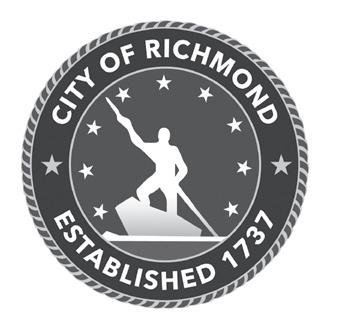

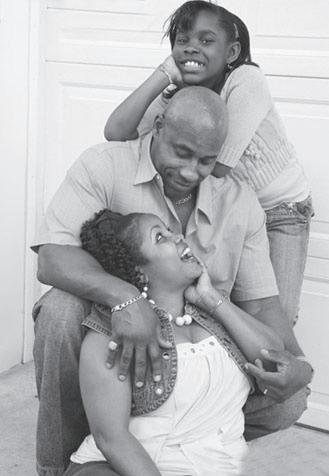

Richmond Highway Improvements, Hull St to Albany Ave
State Project: U000-127-118, UPC 118944 Federal Project: STP-5B27(038)
Tuesday, October 7, 2025
Open House: 5:00 PM to 7:00 PM
Blackwell Community Center – 300 E 15th Street, Richmond, VA 23224
The City of Richmond will hold a Public Hearing for the Richmond Highway Improvements Project. The project is along Richmond Highway from Hull Street to Albany Ave, and includes improvements to Maury Street, Stockton Street, and Decatur Street at Richmond Highway. The project will provide dedicated left-turn lanes on Decatur Street and Maury Street, modernized traffic signals at Maury Street, Stockton Street, and Decatur Street and pedestrian infrastructure including median refuges, bump-outs, pedestrian signals and countdown timers. It will also aim to improve safety via conflict point reduction through entrance closures/consolidations and provide safer and more accessible sidewalks.
Review the proposed project plans depicting the major design features and the National Environmental Policy Act (NEPA) documentation at the Informal Plan Review. The current version of the environmental document will be available for review and comment at the Public Hearing.
Project materials will be available at the public hearing, and can be made available upon request to be viewed in person at another time during the comment period. Give your written or oral comments at the hearing or submit written comments postmarked by October 22, 2025 to Winston Phillips, City of Richmond Public Works, 900 East Broad Street, Richmond, VA 23219 or winston.phillips@rva.gov.
The City of Richmond ensures non-discrimination and equal employment in all programs and activities in accordance with Title VI and Title VII of the Civil Rights Act of 1964. No person shall be excluded from participation in or be denied the benefits of, or be subjected to, discrimination under any program or activity receiving Federal financial assistance.
If you feel you have been denied participation in, or denied benefits of, or been subjected to discrimination, in regard to this project or otherwise discriminated against because of your race, color, national origin, gender, age or disability, you may contact the City of Richmond’s citizen request center at 311. Questions regarding this project should be directed to Winston Phillips at 804-646-6430 or winston.phillips@rva.gov. Any persons with questions on the accessibility of the facility or need for reasonable accommodations should contact Winston Phillips.

for a
By Dan Elson
The Richmond Roadrunners pulled away in the fourth quarter to defeat the Virginia Vitesse 63-59 on Sept. 7 in the first round of the playoffs. A 9-0 run midway through the quarter gave Richmond control as the Vitesse went several minutes without a basket.
“That gave us some breathing room and then, regardless of the mistakes that we made, we still had that lead to recover,” coach Barvenia Wooten said. She added that Richmond’s ability to draw 22 fouls came from attacking the basket with intensity.
Forward Andrea Barbour led the Roadrunners with 26 points and said the matchup was as hard-fought as expected.
“Every time we play them, expect an intense game,” she said. “We were resilient, we finished strong.”
Kala Green added 10 points for Richmond, while Wooten praised Barbour’s impact despite a few miscues.
“AB is what we call ‘Her.’ She shows up. She knows she made some mental hiccups, but at the end of the day, I know she’ll make up for it. She’ll get a defensive rebound, she’ll get a steal.”
Mia Savory led the Vitesse with 20 points. The Roadrunners will travel to Baltimore to face the Maryland Lady Wolves on Sept. 13 at 4 p.m.
Norfolk State scored 21 points in the fourth quarter to rally past Virginia State 34-31 in overtime Saturday night at William “Dick” Price Stadium. The Spartans evened their record at 1-1, while the Trojans fell to 1-1. The victory gave head coach Michael Vick his first win at Norfolk State.
Quarterback Otto Kuhns led the comeback, completing 13 of 20 passes for 173 yards and two touchdowns. Kevon King rushed for 63 yards on nine carries, and Jaylen Laudermilk added 59 yards and a touchdown on three attempts. Ty Jones led the defense with seven tackles, while Major Dillard, Antwan Davis, and Kendric Nowling each had six.
Virginia State opened the scoring with an 11play, 62-yard drive capped by a 22-yard field goal from Joshua Campbell. Norfolk State responded with a blocked punt returned for a touchdown to take a 7-3 lead.
The Trojans regained momentum in the second quarter, scoring twice in three minutes to take a 16-7 lead. Virginia State extended the advantage to 23-10 in the third quarter.
Norfolk State surged in the fourth. Kuhns engineered a 75-yard drive, including a 43-yard completion to Kam’Ryn Thomas, finishing with a touchdown pass to cut the deficit to 23-17. On the next possession, he connected with DreSean Kendrick for an 18-yard touchdown, giving Norfolk State a 24-23 lead.
Virginia State reclaimed the lead on a 28-yard touchdown run with 2:14 remaining. Norfolk State

answered with Laudermilk’s 33-yard touchdown run with 53 seconds left to tie the game at 31.
A 46-yard field goal attempt by Virginia State in the final seconds struck the crossbar, sending the game to overtime. In overtime, Norfolk State’s defense held, with Makai Frisby breaking up a fourth-down pass.
Evan Helfrich then converted a 29-yard field goal to secure the win.
Norfolk State finished with 490 yards of total
offense, compared to 440 for Virginia State. Kuhns and Thomas led the passing attack, while Kendrick and JJ Evans each caught touchdown passes. The Spartans outscored the Trojans 24-15 in the second half and did not commit a turnover in the first two games of the season.
Norfolk State travels to Rutgers on Saturday, Sept. 13, for its first road game. Virginia State will have a bye before visiting Winston-Salem State on Sept. 20.

Free Press staff report
The Richmond Flying Squirrels recently announced additional promotions for the final series at The Diamond, including former player appearances and special concessions.

Heyward
The promotions are part of “Diamonds Aren’t Forever: The Farewell Series,” which runs Tuesday through Saturday. “We’re going all-in to make as many lasting memories as possible during the final homestand at The Diamond,” Flying Squirrels General Manager Anthony Oppermann said. “Every game throughout the week is going to be special.”
Thursday will feature a “Hot Dog Happy Hour” from 5:30-7:30 p.m. with 2-for-1 hot dogs and drink specials.
Former outfielder Jacob Heyward will appear Friday to sign autographs. Heyward played for Richmond from 2019-22 and was named Most Valuable Player of the 2019 Eastern League All-Star Game at The Diamond. He currently manages the San Francisco Giants’ rookie affiliate and was named Arizona Complex League Manager of the Year this season.
Former pitcher Daryl Maday will appear for Sunday’s finale. Maday pitched for the Flying Squirrels from 2010-13 and started the franchise’s first game at The Diamond on April 15, 2010. He also started the team’s first playoff game in 2011 and recorded the final three outs in the franchise’s first no-hitter in 2013.
Fans can sign a concourse wall on the third-base side throughout the week.Tickets are available at SquirrelsBaseball.com/Tickets.
Free Press staff report
A rising American soccer star is taking his talents overseas. Fourteen-year-old Terry Richard of Chesterfield is headed to Spain to train with Patacona CF, a top development club in Valencia.
The move puts Richard, who has drawn the attention of European scouts for several years, on a fast track toward a professional career. Patacona CF, affiliated with LaLiga club Levante UD, has a reputation for developing young talent and helping players move into top European leagues.
“Playing in Spain has always been a goal of mine—not just
for the quality of football, but for the culture and passion the country has for the game,” Richard said. “I’m ready to give everything I’ve got and prove myself in one of the most competitive football environments in the world.” Richard started playing soccer in 2014 in Virginia Beach, quickly standing out in local leagues. He progressed through regional travel clubs, including Western Branch Soccer Club in Chesapeake and Golden Ball Soccer Academy in Hampton Roads, often playing above his age group. From 2021 to 2024, he starred for Richmond United, competing against some of the
Richmond to host monthly boxing series supporting local charities
Free Press staff report
A new monthly boxing series will bring world-class fighters to Richmond starting Sept. 17, with proceeds benefiting local youth programs and nonprofit organizations.
River City Fight Night, organized by River City Promotions and Vintage Boxing Gym, will run through November 2026 at two venues: the Great American Ranch in Midlothian and River City Roll in Richmond. The series will feature WBC title contenders, Olympic medalists, international boxing stars and Richmond-area professional fighters.
Each event is expected to draw 250 to 300 spectators and will be streamed live on YouTube to thousands of viewers worldwide. The fights will showcase four to six bouts per event.
“This series puts Richmond on the boxing map while giving back to the community we love,” said Liz Cane, co-founder of River City Promotions. “We’re thrilled to bring together international and local champions with fans for unforgettable nights of energy and impact.”
Proceeds from each event will support Guardian of the Gloves, a nonprofit that provides boxing access to youth regardless of financial means, and two additional local charitable organizations selected by the Richmond police and fire departments.
The series begins Sept. 17 at Great American Ranch, featuring fighters from Ashenelli Boxing. The second event, scheduled for Nov. 5 at River City Roll, will pit firefighters against police officers in the ring.
Other events, are scheduled for Jan. 21, Feb. 18, April 15, May 20, June 17, July 15, Sept. 16, Oct. 21 and Nov. 18, 2026, alternating between the two venues.
region’s best youth players.
His talent drew national attention, and he was frequently invited to guest play with top East Coast teams at prestigious tournaments. Earlier this year, the Spanish sports management firm TheFutbol.office noticed Richard, leading to a threemonth training stint with Global Football Total and Real Sporting in Gijón, Spain. His performance earned him an invitation to train with Patacona CF.
“Terry is an extraordinary talent whose dedication and work ethic set him apart from his peers,” said Pablo Molina, who has coached Richard since age 6. “His relentless drive to improve, both on and off the field, is matched by a level of focus and intensity rarely seen at any age.”
Richard’s parents, Brandon and Taniki, said they fully support his decision to move abroad. “Watching him stay so focused and committed to his passion fills our hearts with both hope and excitement for what’s to come,” they said.
Richard is expected to return to Spain later this month to continue his training and pursue the next step in his soccer journey.


Free Press staff report
Virginia Union University senior running back Curtis Allen was named National HBCU Player of the Week after rushing for 185 yards and two touchdowns in the Panthers’ 45-3 victory over Miles College in the Black College Football Hall of Fame Classic on Sunday. Allen, a Petersburg native majoring in business,

coach Alvin Parker said. “Having both Curtis and Brady receive CIAA weekly honors is a testament to how well they performed against Miles.” The Panthers will face Edward Waters University in the Unity Classic on Saturday, Sept. 13, at 4 p.m. in Jacksonville, Florida.
One of Virginia’s most selective high schools is starting the new academic year with Kristin Janssen as its executive director — a role that blends administrative oversight with her lifelong passion for teaching. Janssen’s bond with Maggie Walker is personal: Her son graduated in 2023, giving her insight into the student experience she now hopes to expand for every child.
“My son had a really wonderful experience at Maggie Walker. I want every child who walks through the doors to have that same experience,” Janssen said. “I love students, and that’s why I went into education. There’s never a time when I don’t get excited about school.”
Janssen’s enthusiasm for education came early. She played school as a young girl and pursued her dream at Longwood University, where she studied English. Her first teaching job was as an English teacher at Colonial Heights High School. After moving through the ranks as a gifted coordinator, assistant principal, and career and technical administrator, she landed the job of high school principal. She later served as director of curriculum and assessment in Colonial Heights and Buckingham County. Her love of students eventually drew her back to school leadership. When the executive director position opened at Maggie Walker, she applied immediately.
“This is a very unique position because it’s not a traditional principal role,” she said. “You wear a principal lens, but then you have a lot of nu-
ances because you’re working with a board and foundation. I wear a central office hat and a principal hat.”
Her tenure comes at a pivotal moment. The school has long been a point of pride in Virginia, but it has also faced criticism for the underrepresentation of underprivileged and minority students in its admissions.
Janssen acknowledges those challenges and says she is committed to working within the parameters set by the 14 school systems that feed into Maggie Walker. One of her first major projects will be leading the update of the 2023 strategic plan that focuses on long-term inclusivity goals.
“We always want to make gains,” Janssen said. “For me, it’s being present and listening. I want our students to feel valuable and seen.”
In addition to taking on her new role, Janssen is working toward a doctorate in education and is in the midst of writing her dissertation — a reflection of the curiosity and commitment to learning that she hopes to instill in students.
“I love being around smart, curious people,” Janssen said.
“At Maggie Walker, you’re dealing with a lot of really smart people; the staff, faculty and students. I want to be a part of helping the students get to commencement so they can go out into the world and do great things.”
Where were you born?
Born in Henrico and grew up in Chesterfield. I went to L.C. Bird High School. Where do you live now? Midlothian. Education:

Tell me about your family. I grew up with two brothers who gave me different perspectives. I’m married with two sons.
Can you share a brief history of Maggie L. Walker Governor’s School for Government and International Studies?
Maggie L. Walker High School was built in 1937 and named in honor of the first woman and the first African American woman to found a chartered bank in the United States. It was one of two schools for Black students in the Richmond area during the time of racial segregation. In 2001, the high school, which had been abandoned since 1990, reopened as Maggie L. Walker Governor’s School for Govern-
ment and International Studies.
The school has a nonprofit 501(c)(3) organization created solely to support and enhance academic enrichment opportunities, underwriting initiatives such as academic competitions, student travel, new technology and student aid.
What is its mission?
To provide comprehensive educational opportunities that advance gifted students’ understanding of world cultures and languages. Our diverse and supportive community develops students’ character and ability to contribute, collaborate and lead.
When did you take over as executive director?
July 1.
What are your goals for Maggie Walker in terms of curriculum, student experience and community impact?
We’re in a very beautiful historic building named after a trailblazer. I want to expand our four pillars of the Walker Way — courage, compassion, community and collaboration. I want to listen to what the students have to say and build on what’s already in place.
What does success in this position look like to you in the next two to three years?
It’s the commencement ceremony, marking the end of students’ academic journey and their transition into the world. I also want an active PTSA and to update the facilities.
What strategies are you putting in place to sustain and expand on recent gains
in enrollment diversity?
When it comes to the application process, the school districts do that. They have looked at that to improve it and make it more inclusive. Because of that, we are becoming more diverse. I also want to build a more diverse staff.
How do you respond to those who worry admissions changes could compromise academic rigor?
I haven’t seen that at all in education. When you tell students where the bar is, they’ll reach it. We can’t make predeterminations based on biases.
What concrete initiatives are you implementing to create a more inclusive environment?
We already have the pillars. We’re in the process of updating the strategic plan that incorporates our efforts for diversity and inclusion.
How will you engage families from underrepresented backgrounds who may feel disconnected from the admissions process or school culture?
Groundwork was laid for me. I just had to pick up the effort. We have a school social worker who helps us. The foundation is laid during the ninth-grade family night. I get face time with the parents of students just entering. I want them to feel comfortable with me.
Given the history of disparities, what would you say to families who believe Maggie Walker was not built for their children?
I think the outreach and efforts we’re making, as well as the 14 districts, reflect our desire for diversity and different
thinking and culture. We’re doing a different model since my son was there. We’re visiting localities with student leaders to explain why kids would be a good fit for the school through informational sessions.
How do you start your day?
I walk my dog with my husband in any kind of weather. It’s a brisk 30-minute walk. I love routine and being outside.
Who is your dream dinner party guest?
My husband’s grandfather was a two-star Army general and a doctor in the Army. I was young when he died, and I didn’t have the maturity to ask him about his selflessness and what led him to be such a humanitarian.
What are the three words that best describe you?
Small (in stature), curious and generous.
What is a quote that inspires you?
“If you could only sense how important you are to the lives of those you meet; how important you can be to the people you may never even dream of,” by Fred Rogers, a.k.a. Mister Rogers.
Who has had the most influence in your life?
My mom, but also all the students.
What’s a book that has influenced you?
“Brave New World,” by Aldous Huxley. What are you currently reading?
“Death by Meeting,” by Patrick Lencioni. What is next for you?
Completing my dissertation will be a great accomplishment.

The Well Collective drew a crowd to Main Street Station on Sept. 6 for “The WELL Fest,” a daylong celebration of Richmond’s arts, culture and music scene with a focus on wellbeing.The event kicked off Thursday with “Rooted: A Taste of Culture Through Jazz and Culinary Art,” pairing live jazz with gourmet dining. Friday featured “Rooted in Richmond: A Social + Cultural Conversation,” a panel presented with Conversations Unearthed. Saturday opened with Morning Wellness — movement, breath and sound exercises — before a packed schedule of vendors, performances and a finale by the Sainted Trap Choir.

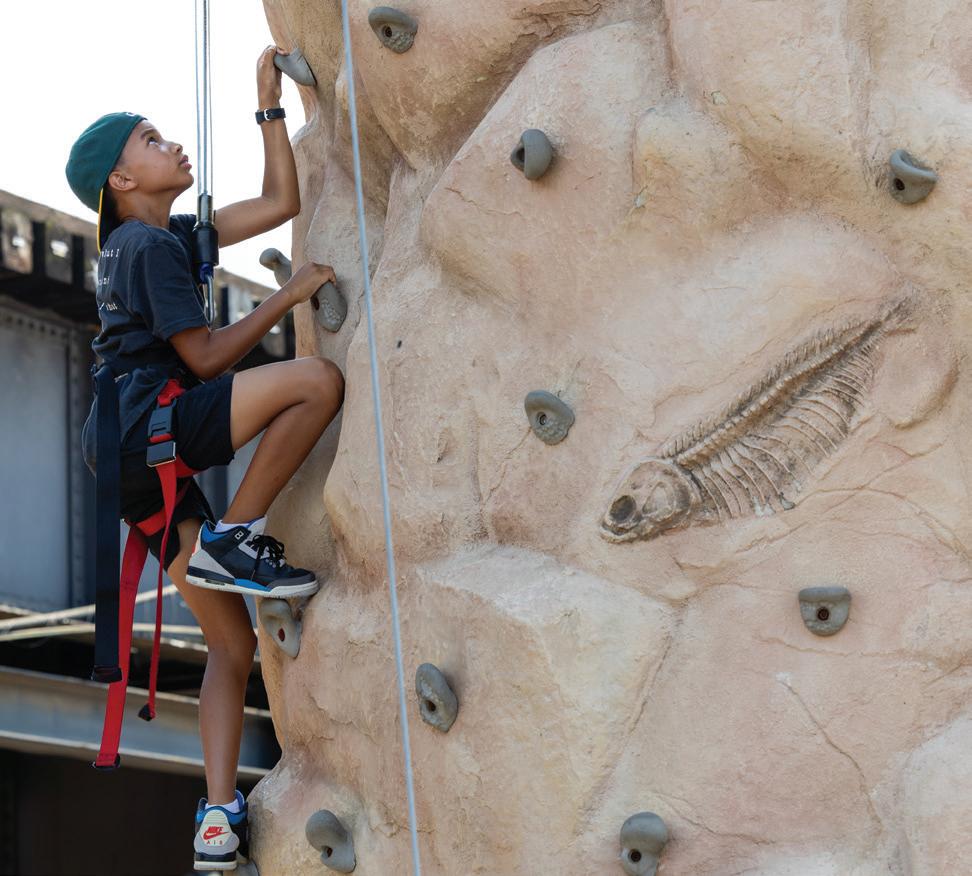




The Kennanee Native Arts
Black Girl Rally returns with prizes, activities, and parents
Free Press staff report
Girls For A Change will host its annual Black Girl Rally on Friday, Sept. 26, from 6 to 9 p.m. at the Victory Theater & Event Center in Chesterfield. The event kicks off the school year with activities, conversations and family engagement for Black girls in grades 5-12 and their parents or guardians.

tion. Johnson Dias, also the mother of Marley Dias known for her #1000BlackGirlBooks campaign, will discuss strategies for raising confident, purposeful girls.
This year’s rally marks the first time the celebration will include parents and other caring adults, providing support and resources for both the girls and the adults in their lives.
“We believe our girls need support not just on the first day of school, but for all 180 days of the year,” said Angela Patton, CEO of Girls For A Change. “Parents also need encouragement, resources and a reminder that they are not alone. This rally is about strengthening our village.”
The evening will feature a fireside chat with Janice Johnson Dias, author of “Parent Like It Matters: How to Raise Joyful Change-Making Girls” and co-founder of the GrassROOTS Community Founda-
Rally activities will include family photoshoots, candlemaking, self-defense classes, line dancing, cookin and collaborative art projects. The event will also feature music from a DJ and hosts Nickey McMullen and comedian Antoine Scott. Door prizes and raffles include museum memberships, restaurant and local business gift cards, a Sunday pass to the Broccoli City Festival in Washington, D.C., an overnight stay at Salamander Resort, Apple Watches and a full ride to Camp Diva Leadership Academy in summer 2026. The theme of this year’s rally focuses on the power of showing up for children, whether as a parent, grandparent, guardian or other supportive adult. Registration is free although donations are encouraged, and attendees may purchase raffle tickets in advance to support GFAC’s after-school programs. Families can also register for GFAC programs during the event.
Free Press staff report
Grammy-nominated singer-songwriter Cody Fry will join the Richmond Symphony for the 2025-26 season opener on Saturday, Sept. 13, at 7:30 p.m. at the Altria Theater.
The concert will feature Fry’s orchestral pop compositions, blending cinematic arrangements with pop storytelling under the direction of Music Director Valentina Peleggi, who is in her fifth season with the symphony.
Fry first gained national attention as a Top 48 contestant on the 14th season of “American Idol.” He has since released seven solo albums, performed at sold-out venues across the U.S., and earned more than 300 million streams. His notable works include “I Hear a Symphony” and “Underground” as well as orchestral covers of pop classics. He received Grammy nominations in 2021 for his cover of the Beatles’ “Eleanor Rigby” and in 2025 for his arrangement of Simon and Garfunkel’s “The Sound of Silence.” Tickets are available at richmondsymphony.com.







First African Baptist Church is playing a vital role in bringing the story of Gabriel’s Rebellion to the stage through the new musical “Gabriel,” which runs Sept. 26 to Nov. 9 at Hanover Tavern.
The historic church, founded in 1780 and a cornerstone of Richmond’s Black community for generations, is hosting rehearsals for the production and providing pastoral guidance through Senior Pastor Rodney Waller, who serves as pastoral advisor for the musical.
“Gabriel” tells the powerful story of Gabriel’s Rebellion, the major 1800 uprising planned by enslaved men in Richmond. Gabriel, born in 1776, was a literate blacksmith who, inspired by the call to freedom that drove the American Revolution, organized an estimated 1,000 co-conspirators to seize Richmond, take
Gov. James Monroe hostage and demand an end to slavery.
Although torrential rains on Aug. 30, 1800, prevented the plan from moving forward, Gabriel and his fellow freedom fighters left a lasting legacy. After Gabriel and 24 others were executed, their courage was eventually recognized when the Richmond City Council honored them in 2002, and Gov. Tim Kaine pardoned the men in 2007.
The musical, presented by ATLAS Partnership and designated as an official program of the Virginia 250 Commission, features Broadway veteran Jerold Solomon in the title role. The production draws additional historical significance from its venue — five of Gabriel’s co-conspirators were enslaved at Hanover Tavern, where the show will be performed.
“Gabriel’s story is about people — it’s an adventure, not a textbook,” said Ron
Klipp, co-author, composer and musical director. “This is a theatrical experience that draws its strength from history, but its heartbeat from the energy of live performance.”
“The mission of ATLAS Partnership is to recognize and respect, honor and protect the legacy assets of professional theater in Central Virginia,” said Emily Cole-Jones, producing team member. “Producing this new musical ‘Gabriel’ clearly fits within that mission, and we are proud to do so in association with Virginia’s diverse arts, historic and faith communities.”
First African Baptist Church’s involvement in this production continues the congregation’s long tradition of supporting the preservation and celebration of African American history and culture in Richmond.
For tickets and information, visit atlaspartnership.org.

Free Press staff report
Westwood Baptist Church will host a panel discussion titled “Stay Awake Sunday” on Sunday, Oct. 5 from 9:30 to 11 a.m. The event will examine the legacy of civil rights legislation and the impact of current political decisions on Black, Indigenous and other communities of color. The discussion aims to mobilize attendees to become politically involved, focusing on executive orders, federal
budget cuts and other policies under the Trump administration that organizers say disproportionately affect Black and Brown communities.
Panelists will include Pastor Michael R. Lomax, attorney Ta-Tanisha Long Manson, law student Breanna Prentiss and Univeristy of Richmond professor Ernest McGowen. Topics will cover executive orders and diversity, equity and inclusion initiatives, the Civil Rights Act, immigration, the 14th Amendment, the politics
of marginalization, and the role of the church in political action.
Organizers said the event is intended to educate attendees on policy issues, encourage dialogue and inspire civic engagement, including holding elected officials accountable and participating in local, state and national elections.
The discussion will also emphasize gratitude and community, citing Philippians 2:1-4, which calls for unity, compassion and valuing the interests of others.

the Black Church in the United States” on Saturday, Sept. 27 from 8:30 a.m. to 12:30 p.m. in the church’s Fellowship Hall, 9008 Quioccasin Road. Doors open at 8 a.m., with coffee available.
The lecture will explore the history of African American Christians and the role of the Black church in promoting spiritual and social change. The event is free, but registration is required.





Walter R. Strickland II, associate professor of systematic and contextual theology at Southeastern Baptist Theological Seminary and author of “Swing Low: A History of Black Christianity in the United States,” will lead the



lecture. Strickland, founder of Cultural Engagement and Aptree Learning, also serves as a teaching elder at Imago Dei church in Raleigh, North Carolina, and hosts the White Horse Inn podcast.
For more information or to register, visit wepc.org.














296-255, adopted Sep. 8, 2003, which authorized a Community Unit Plan at 1300 Westwood Avenue for a mixed-use development consisting of a maximum of one hundred forty residential units, a community center with reception facility and non-medical office, a preventative healthcare facility, two private schools, and a fifty unit dormitory, and modified the plan for the fence required between the subject property and 1409 Palmyra Avenue, to modify the Community Unit Plan to allow for the development of tennis courts.
Ordinance No. 2025-183
To declare that Council has not authorized redevelopment of Gilpin Court and prohibit undertakings pursuant to a certain Master Development Agreement to redevelop Gilpin Court without Council authorization.
(COMMITTEE: Land Use, Housing and Transportation, Tuesday, September 16, 2025, 3:00 p.m.)
Ordinance No. 2025-184
To provide for the granting by the City of Richmond to the person, firm or corporation to be ascertained in the manner prescribed by law of an easement upon, over, under, and across certain property known as Thomas B. Smith Community Center and located at 2009 Ruffin Road for the construction, maintenance, and operation of improvements and associated appurtenances for the generation, distribution and transmission of electricity in
(COMMITTEE: Land Use, Housing and Transportation, Tuesday, September 16, 2025, 3:00 p.m.)
Ordinance No. 2025-185
To provide for the granting by the City of Richmond to the person, firm or corporation to be ascertained in the manner prescribed by law of an easement upon, over, under, and across certain property known as Lucks Field Community Center located at 1925 U Street for the construction, maintenance, and operation of improvements and associated appurtenances for the generation, distribution and transmission of electricity in accordance with a certain Right of Way Agreement.
(COMMITTEE: Land Use, Housing and Transportation, Tuesday, September 16, 2025, 3:00 p.m.)
Ordinance No. 2025-186
To provide for the granting by the City of Richmond to the person, firm or corporation to be ascertained in the manner prescribed by law of an easement upon, over, under, and across certain property known as St. Mary’s Hospital located at 5801 Monument Avenue for the construction, maintenance, and operation of improvements and associated appurtenances for the generation, distribution and transmission of electricity in accordance with a certain Right of Way Agreement.
(COMMITTEE: Land Use, Housing and Transportation, Tuesday, September 16, 2025, 3:00 p.m.)
Ordinance No. 2025-187 To approve the Work Plan and Budget for the fiscal year ending June 30, 2026, for the provision of services in the Downtown Special Service and Assessment Districts. (COMMITTEE: Finance and Economic Development, Wednesday, September 17, 2025, 2:00 p.m.)
Ordinance No. 2025-189 To authorize the Chief Administrative Officer, for and on behalf of the City of Richmond, to accept funds in the amount of $8,719.00 from the United States Department of Housing and Urban Development, and to amend the Fiscal Year 2025-2026 Special Fund Budget by increasing estimated revenues and the amount appropriated to the Department of Housing and Community Development’s HOME - ARP Special Fund by $8,719.00 for the purpose of funding the construction of the Rady Street Apartments project.
Ordinance No. 2025-192 To authorize the Chief Administrative Officer, for and on behalf of the City of Richmond, to execute a First Amendment to Lease Agreement between the City of Richmond and Challenge Discovery Projects, Inc. for the purpose of providing outpatient behavioral health clinic services at 2405 Jefferson Avenue. (COMMITTEE:
Land Use, Housing and Transportation, Tuesday, September 16, 2025, 3:00 p.m.)
Ordinance No. 2025-193
To authorize the Chief Administrative Officer, for and on behalf of the City of Richmond, to execute a Standard
Project Administration Agreement between the City of Richmond and the Virginia Department of Transportation for the purpose of funding the FLT – Kanawha Plaza Multi Use Trail project. (COMMITTEE:
Land Use, Housing and Transportation, Tuesday, September 16, 2025, 3:00 p.m.)
Ordinance No. 2025-194
To designate the 2800 block of 3rd Avenue in honor of the Reverend F. Todd Gray. (COMMITTEE:
Land Use, Housing and Transportation, Tuesday, September 16, 2025, 3:00 p.m.)
Ordinance No. 2025-195
To designate the 4800 block of Bryce Lane in honor of Dr. Lois Bias.
(COMMITTEE: Land Use, Housing and Transportation, Tuesday, September 16, 2025, 3:00 p.m.)
Ordinance No. 2025-196
To designate the 3400 block of Castlewood Road in honor of Bishop Alfred L. Nicholson. (COMMITTEE: Land Use, Housing and Transportation, Tuesday, September 16, 2025, 3:00 p.m.)
Ordinance No. 2025-197
To designate the 200 block of East 19th Street in honor of Curtis T. “Bubba” Johnson. (COMMITTEE:
Land Use, Housing and Transportation, Tuesday, September 16, 2025, 3:00 p.m.)
Ordinance No. 2025-198
To designate the 200 block of East Clay Street in honor of Jack Green. (COMMITTEE: Land Use, Housing and Transportation, Tuesday, September 16, 2025, 3:00 p.m.)
Ordinance No. 2025-199
To designate that portion of West Broad Street located between North Foushee Street and North Adams Street in honor of Ted Santarella.
(COMMITTEE: Land Use, Housing and Transportation, Tuesday, September 16, 2025, 3:00 p.m.)
Ordinance No. 2025-200
To designate the 1600 block of South Meadow Street in honor of Dr. Joan Belle Christian.
(COMMITTEE: Land Use, Housing and Transportation, Tuesday, September 16, 2025, 3:00 p.m.)
Ordinance No. 2025-201
To authorize the Chief Administrative Officer, for and on behalf of the City of Richmond, to accept funds in the total amount of $224,012.00 from the Great American Insurance Company, and to amend Ord. No. 2025058, adopted May 12, 2025, which accepted a program of proposed Capital Improvement Projects for Fiscal Year 2025-2026 and the four fiscal years thereafter, adopted a Capital Budget for Fiscal Year 20252026, and determined a means of financing the same, to appropriate the increase to the Fiscal Year 2025-2026 Capital Budget by increasing estimated revenues and the amount appropriated to the Department of Public Works’ Complete Streets project in the Transportation – Federal/ State/Regional category by $224,012.00, for the purpose of appropriating funds received from the Great American Insurance Company for various infrastructure improvements in the Governor’s Retreat subdivision.
Ordinance No. 2025-202 To authorize the Chief Administrative Officer, for and on behalf of the City of Richmond, to accept funds in the total amount of $4,388,200.00 from the Virginia Department of Transportation and to amend Ord. No. 2025058 adopted May 12, 2025, which accepted a program of proposed Capital Improvements Projects for the Fiscal Year 2025-2026 and the four fiscal years thereafter, adopted a Capital Budget for Fiscal Year 2025-2026, and determined a means of financing the same, by (i) establishing a new project for the Department of Public Works in the Transportation category called the “Fall Line Trail (FLT) – Kanawha Plaza Multi Use Trail” project and (ii) increasing estimated revenues and the amount appropriated to the new Department of Public Works’ “Fall Line Trail (FLT) –Kanawha Plaza Multi Use Trail” project in the Transportation category by $4,388,200.00, for the purpose of providing funding for the Fall Line Trail Kanawha Plaza Multi
Ordinance No.
To
on behalf of the City of Richmond, to execute an Amendment I: Extension of Project Period between the City of Richmond and the National Recreation and Park Association for the purpose of supporting the ongoing implementation of the Mentoring Opportunities for Youth Initiative project. (COMMITTEE: Finance and Economic Development, Wednesday, September 17, 2025, 2:00 p.m.)
Ordinance No. 2025-205 To authorize the Chief Administrative Officer, for and on behalf of the City of Richmond, to accept funds in the amount of $125,000.00 from the Virginia Department of Criminal Justice Services and to amend the Fiscal Year 2025-2026 Special Fund Budget by increasing estimated revenues and the amount appropriated to the Department of Justice Services’ Help Me Help You Program Special Fund by $125,000.00 for the purpose of funding the Help Me Help You program. (COMMITTEE: Finance and Economic Development, Wednesday, September 17, 2025, 2:00 p.m.)
Ordinance No. 2025-206 To amend Ord. No. 2025057, adopted May 12, 2025, which adopted the Fiscal Year 2025-2026 Special Fund Budget and made appropriations pursuant thereto, by (i) increasing anticipated revenues from certain funds due to the City from the Virginia Department of Taxation , in accordance with Va. Code § 58.11748 and Ord. No. 2025099, adopted Jun. 2, 2025, by $200,000.00; (ii) creating a new special fund for the Office of Sustainability called the “Disposable Plastic Bag Tax Special Fund;” and (iii) appropriating the increase to the Fiscal Year 2025-2026 Special Fund Budget by increasing the estimated revenues and the amount appropriated to the Office of Sustainability’s “Disposable Plastic Bag Tax Special Fund” by $200,000.00, all for the purpose of funding local environmental cleanups, education programs designed to reduce environmental waste, pollution and litter mitigation, and providing reusable bags to recipients of the Supplemental Nutrition Assistance Program or Women, Infants, and Children Program benefits. (COMMITTEE: Finance and Economic Development, Wednesday, September 17, 2025, 2:00 p.m.) Ordinance No. 2025-207 To amend City Code § 26-355, concerning the levy of tax on real estate, to establish a tax rate of $1.20 for the tax year beginning Jan. 1, 2026, pursuant to Va. Code § 58.1-3321(b), and increasing such rate from the Rolled Back Tax Rate of $1.146 as computed in accordance with Va. Code § 58.13321(a). (COMMITTEE: Finance and Economic Development, Wednesday, September 17, 2025, 2:00 p.m.) Ordinance No. 2025-208 To amend City Code § 26-355, concerning the levy of tax on real estate, to establish a tax rate of $1.16 for the tax year beginning Jan. 1, 2026, pursuant to Va. Code § 58.1-3321(b), and increasing such rate from the Rolled Back Tax Rate of $1.146 as computed in accordance with Va. Code § 58.13321(a). (COMMITTEE: Finance and Economic Development, Wednesday, September 17, 2025, 2:00 p.m.)
DIVORCE
VIRGINIA: IN THE CIRCUIT COURT FOR THE COUNTY OF HENRICO
4301 EAST PARHAM ROAD, HENRICO, VA 23228
ANNA MARIA EASLEY, Plaintiff v. MARK ANTHONY EASLEY Defendant. Case No.: CL25002741-00
ORDER OF PUBLICATION
The object of this suit is to: Divorce (Separation for more than one year).
It is ORDERED that Mark Anthony Easley appear at the above-named court and protect his/her interests on or before 11/10/25 at 9:00 AM. A Copy, Teste: HEIDI S. BARSHINGER, Clerk
VIRGINIA: IN THE CIRCUIT COURT FOR THE COUNTY OF HANOVER TINELLE ROSS, Plaintiff v. WILBERT ROSS, Defendant. Case No.: CL25000282-00 ORDER OF PUBLICATION
The object of this suit is to obtain a divorce from the bond of matrimony from the defendant on the ground of living separate and apart without any cohabitation and without interruption for a period exceeding twelve months.
It is ORDERED that the defendant, whose whereabouts are unknown, appear here on or before the 20th day of October, 2025 at 9:00 a.m. and protect his interests. A Copy, Teste: FRANK D. HARGROVE, JR., Clerk I ask for this: Dorothy M. Eure, Esquire Law Office of Dorothy M. Eure, P.C. VSB# 27724 8460 Mount Eagle Road Ashland, VA 23005 (804 798-9667
VIRGINIA: IN THE CIRCUIT COURT FOR THE COUNTY OF HANOVER ALEXIS BLAKE-KANAGI, Plaintiff v. FABAKARY KANAGI, Defendant. Case No.: CL25002832-00 ORDER OF PUBLICATION
VIRGINIA: IN THE CIRCUIT COURT FOR THE COUNTY OF HANOVER DERRICK BRENT SPAIN, Plaintiff v. JACLYN SPAIN, Defendant. Case No.: CL25001901-00 ORDER OF PUBLICATION The object of this suit is to obtain a divorce from the bond of matrimony from the defendant on the
The object of this suit is to obtain a divorce from the bond of matrimony from the defendant on the ground of living separate and apart without any cohabitation and without interruption for a period exceeding twelve months. It is ORDERED that the defendant, whose whereabouts are unknown, appear here on or before the 14th day of October, 2025 at 9:00 a.m. and protect his interests. A Copy, Teste: FRANK D. HARGROVE, JR., Clerk I ask for this: Law Office of Dorothy M. Eure, P.C. Dorothy M. Eure, Plaintiff’s Attorney VSB# 27724 8460 Mount Eagle Road Ashland, VA 23005 (804 798-9667
for the generation, distribution and transmission of electricity on that property as described and under the conditions set forth in the Right of Way Agreement. All bids for the easement hereby offered to be granted must be submitted in writing to the City Clerk’s office by 5:00 p.m. on Friday, September 19, 2025. Bids will be presented to the presiding officer of the Council of the City of Richmond on Monday, September 22, 2025, at 6:00 p.m. in open session and then will be presented by the presiding officer to the Council and be dealt with and acted upon in the mode prescribed by law.
The City of Richmond expressly reserves the right to reject any and all bids. The successful bidder shall reimburse the City for all costs incurred in connection with the advertisement of this ordinance in accordance with section 15.2-2101 of the Code of Virginia and shall post the bond required by the ordinance.
A copy of the full text of the ordinance, Ord. No. 2025185 is on file in the City Clerk’s Office, and the full text of the ordinance and Right of Way Agreement to be executed is available at: https://richmondva.legistar.com/LegislationDetail. aspx?ID=7497542&GUID=2C4152F9-B699-42AB-A582EA4AF06EFFDB&Options=ID|Text|&Search=2025-185
Interested citizens who wish to speak will be given an opportunity to do so by following the instructions referenced in the September 22, 2025 Richmond City Council Formal meeting agenda. Copies of the full text of all ordinances are available by visiting the City Clerk’s page on the City’s Website at https:// www.rva.gov/office-cityclerk, and in the Office of the City Clerk, City Hall, 900 East Broad Street, Suite 200, Richmond, VA 23219, from 8:00 a.m. to 5:00 p.m. Monday through Friday. Candice D. Reid City Clerk QUENTIN ALPHONZO SQUARE, Defendant. Civil Law No.: CL24-4008-BBC ORDER OF PUBLICATION The object of the abovestyled suit is to obtain a divorce from the bonds of matrimony from the· defendant on the grounds that the parties have lived separate and apart without interruption and without cohabitation for a period of more than one year, since September 30, 2015, And it appearing by Affidavit filed according to law that

Please address any questions or bids to: Candice D. Reid, City Clerk City of Richmond 900 East Broad Street, Suite 200 Richmond, Virginia 23219 (804) 646-7955 To advertise




